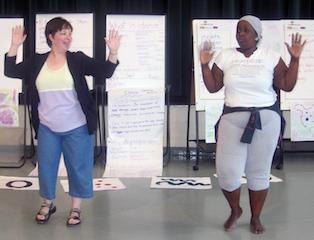Professional Development Services

Effective professional development is ongoing and sustained, engages participants in the pursuit of answers to genuine questions, and helps participants reflect on their teaching and build collegial relationships.
To improve student achievement, schools must weave continuous learning for teachers into the fabric of the teaching job. Teachers need partners who can help them enhance their knowledge and skills. In order to accomplish this, teachers and professional development providers should form genuinely collaborative relationships.
Arts-Based Collaborative works collaboratively with schools to develop and implement site-based professional learning programs that include summer workshops and individualized mentoring during the academic year.
Tailored Partnerships
Arts-Based Collaborative has created Professional Learning Program in Arts Integration in response to research that has shown that effective professional development must be ongoing, experiential, and engaging; contain focused and relevant content; and become job embedded to effectively impact teacher change. The basic program includes summer workshops and onsite mentoring throughout the academic year.
Arts-Based Collaborative staff act as facilitators and mentors for learning communities of educators who explore learning in, about, and through the arts. Educators examine arts integration pedagogy, investigate instructional and assessment practices across grade levels and subject areas, and devise site-based curriculum aligned with state and national educational standards.
The program recognizes that teachers bring varying levels of expertise to the table and invites them to work with their Arts-Based Collaborative mentor in an individualized way. However, the collaboration between teacher and Arts-Based Collaborative mentor branches out into the entire school. As teachers work through the program, Arts-Based Collaborative mentors facilitate many opportunities for teachers to partner and co-teach with their colleagues. As a result, teachers become more effective collaborators with their surrounding community.
A vital piece of this program is establishing an onsite Arts Leadership Team that consists of teachers, school administrators, and other community stakeholders. The Arts Leadership Team provides a forum in which all educators have a voice in the management and execution of the arts integration initiative. Maintaining ownership among stakeholders is critical for the program’s long-term success and sustainability.
Mentoring
Arts-Based Collaborative directors provide on-site individualized assistance to teachers implementing a comprehensive arts education program or working with concept-based arts integration. Mentoring services provide teachers with information, training, and guidance in the pedagogy and practice of arts education and arts integration. Arts-Based Collaborative directors model instruction, team teach, facilitate lesson design, review and evaluate instructional materials, offer feedback regarding observed collaborative planning and instruction, analyze student work, facilitate dialogue with peers, and engage in analytical and reflective dialogue with teachers.
Workshops
Individual offerings in each art form introduce the philosophy and practice of comprehensive arts education. Teachers deepen their understanding of arts elements, structures, and strategies; engage in the artistic processes of creating, performing, and responding; and examine developmentally appropriate practice.
Arts Integration
These workshops focus on the philosophy and practice of concept-based arts integration. Teachers learn in, about, and through the arts as they identify key principles of arts integration, examine authentic connections among the arts and other subjects, and engage in lessons that model effective practice.
Curriculum Design
Teachers become acquainted with national and state curriculum standards, explore the backward design process, analyze the instructional design of model arts integrated lessons, and begin developing their own lessons that connect the arts with their existing curriculum.